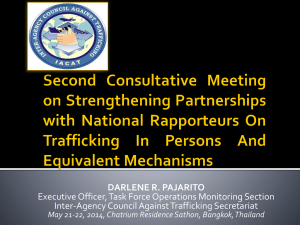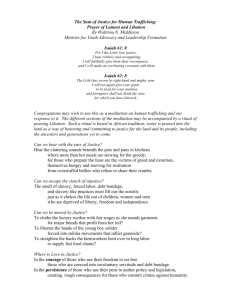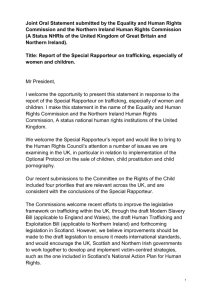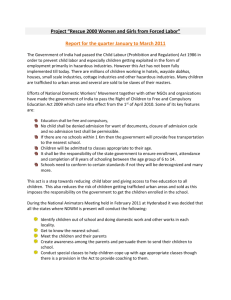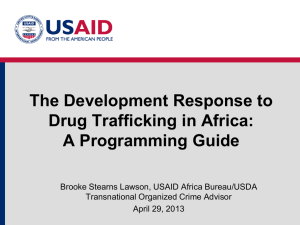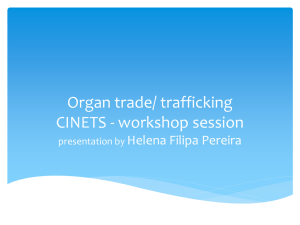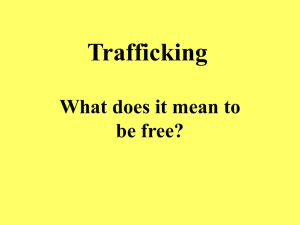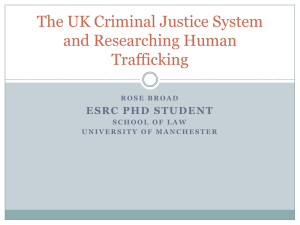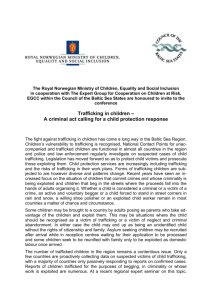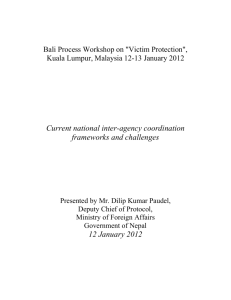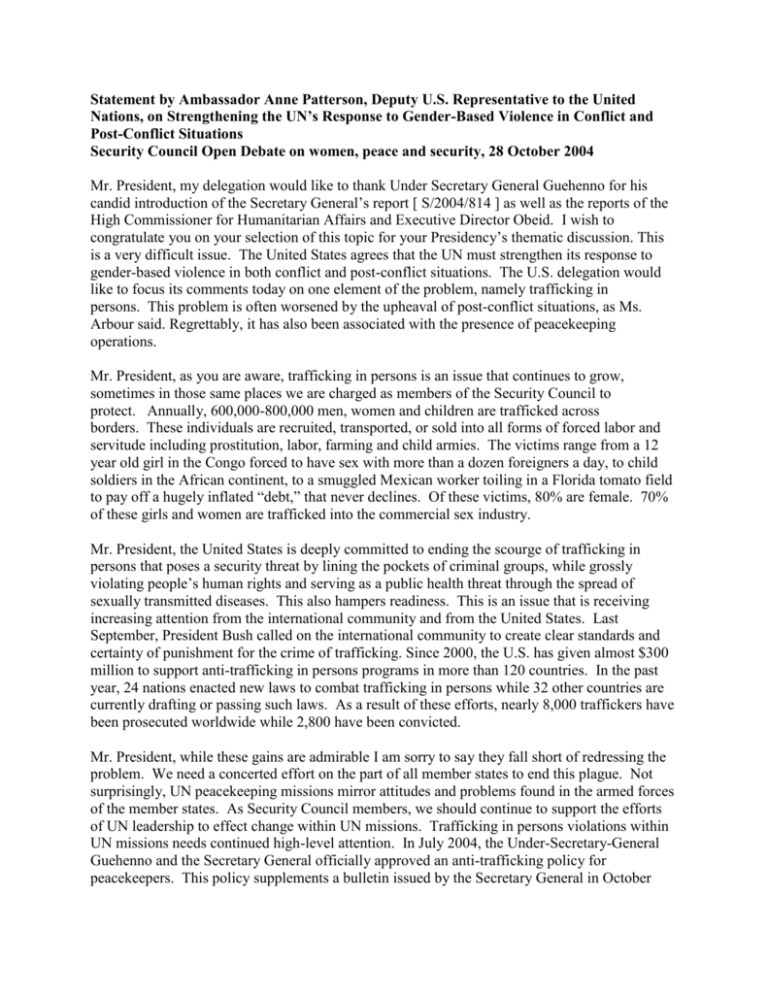
Statement by Ambassador Anne Patterson, Deputy U.S. Representative to the United
Nations, on Strengthening the UN’s Response to Gender-Based Violence in Conflict and
Post-Conflict Situations
Security Council Open Debate on women, peace and security, 28 October 2004
Mr. President, my delegation would like to thank Under Secretary General Guehenno for his
candid introduction of the Secretary General’s report [ S/2004/814 ] as well as the reports of the
High Commissioner for Humanitarian Affairs and Executive Director Obeid. I wish to
congratulate you on your selection of this topic for your Presidency’s thematic discussion. This
is a very difficult issue. The United States agrees that the UN must strengthen its response to
gender-based violence in both conflict and post-conflict situations. The U.S. delegation would
like to focus its comments today on one element of the problem, namely trafficking in
persons. This problem is often worsened by the upheaval of post-conflict situations, as Ms.
Arbour said. Regrettably, it has also been associated with the presence of peacekeeping
operations.
Mr. President, as you are aware, trafficking in persons is an issue that continues to grow,
sometimes in those same places we are charged as members of the Security Council to
protect. Annually, 600,000-800,000 men, women and children are trafficked across
borders. These individuals are recruited, transported, or sold into all forms of forced labor and
servitude including prostitution, labor, farming and child armies. The victims range from a 12
year old girl in the Congo forced to have sex with more than a dozen foreigners a day, to child
soldiers in the African continent, to a smuggled Mexican worker toiling in a Florida tomato field
to pay off a hugely inflated “debt,” that never declines. Of these victims, 80% are female. 70%
of these girls and women are trafficked into the commercial sex industry.
Mr. President, the United States is deeply committed to ending the scourge of trafficking in
persons that poses a security threat by lining the pockets of criminal groups, while grossly
violating people’s human rights and serving as a public health threat through the spread of
sexually transmitted diseases. This also hampers readiness. This is an issue that is receiving
increasing attention from the international community and from the United States. Last
September, President Bush called on the international community to create clear standards and
certainty of punishment for the crime of trafficking. Since 2000, the U.S. has given almost $300
million to support anti-trafficking in persons programs in more than 120 countries. In the past
year, 24 nations enacted new laws to combat trafficking in persons while 32 other countries are
currently drafting or passing such laws. As a result of these efforts, nearly 8,000 traffickers have
been prosecuted worldwide while 2,800 have been convicted.
Mr. President, while these gains are admirable I am sorry to say they fall short of redressing the
problem. We need a concerted effort on the part of all member states to end this plague. Not
surprisingly, UN peacekeeping missions mirror attitudes and problems found in the armed forces
of the member states. As Security Council members, we should continue to support the efforts
of UN leadership to effect change within UN missions. Trafficking in persons violations within
UN missions needs continued high-level attention. In July 2004, the Under-Secretary-General
Guehenno and the Secretary General officially approved an anti-trafficking policy for
peacekeepers. This policy supplements a bulletin issued by the Secretary General in October
2003, which also established guidelines of acceptable conduct by UN peacekeepers. This
bulletin prohibits acts of sexual exploitation and sexual abuse by UN staff or UN forces
conducting operations under UN command, including the “exchange of money, employment,
goods or services for sex” and sexual activity with persons under age 18.
However, a policy is only as good as its enforcement. We welcome Mr. Guehenno’s statement
that t he UN will enforce a policy of zero-tolerance in sex trafficking at every UN mission. We
must also enforce the same zero-tolerance policy with prostitution, as this fuels the demand for
human trafficking victims by serving as a cover under which traffickers operate. We also seek to
put in place trafficking in persons training for all UN peacekeepers, which would be mandatory
prior to their deployment.
Mr. President, the U.S. commends the work of the DPKO Best Practices Unit to this end. In July
of this year, the U.S. Department of State provided $200,000 in funding support to the Best
Practices Unit for the production of anti-trafficking awareness materials. Best Practices will
produce over 60,000 posters, brochures and pocket cards, translated into 10 peacekeeping
languages, for distribution to all missions, regional training centers, and to pre-deployment
training centers of the main troop-contributing countries. However, having one staff member
dedicated to addressing the issues of trafficking in persons among all UN peacekeepers is not
enough, especially when that one position will expire in the next two months. And while these
efforts are useful in raising awareness they will be meaningless unless Peacekeepers receive
mandatory training which clearly outlines the U.N.’s “zero tolerance” policy and they receive
proper punishment which fits the crime. Most importantly, we need a dedicated U.N. leadership
position to carry out these major goals.
Mr. President, by definition, post-conflict societies are those which suffer from weak rule of
law. United Nations peacekeeping missions need to be at the forefront of ensuring that gender
based violence is eliminated and redressed. We can do this by creating concrete steps and
actions to ensure compliance. Thank you.

